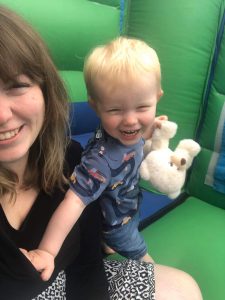I’ve had CMT my entire life. It runs on my dad’s side of the family. My parents knew I had CMT when I was born, but a genetic test confirmed it as a toddler. Early on, CMT affected me most by watching the effects it had on my dad, uncle and grandmother. The memory of my dad walking me down the aisle at my wedding hits me especially hard. Would I require an operation to help me walk one day, too? And now I was married — what about motherhood and CMT?
Now in my 30s, the cruelty of CMT has slowly started taking its toll. I struggle to stand for long periods of time, I can’t wear heels and I have very sensitive feet, unable to walk on surfaces like sand. The possibility — and fear — of passing CMT onto my children has always been a concern. The fact that my future son or daughter would have a 50% chance of being diagnosed with CMT was an overwhelming thought. Early in our marriage, my husband and I spoke to a specialist to understand our available options for starting a family. We decided to try having a baby naturally.
I Don’t Want to Worry about the Future
 When I was pregnant, we chose not to get our little one tested for the CMT gene. Because of the CMT type I have, we knew if the baby were a boy and had CMT, he would be more likely to show symptoms early. If it were a girl, she would probably not be affected until later in life based on our family history. During our 20-week appointment, we found out I was having a boy. While excited, it was the first time I felt that pang of guilt. What if I pass CMT onto my son, and it has a much greater impact?
When I was pregnant, we chose not to get our little one tested for the CMT gene. Because of the CMT type I have, we knew if the baby were a boy and had CMT, he would be more likely to show symptoms early. If it were a girl, she would probably not be affected until later in life based on our family history. During our 20-week appointment, we found out I was having a boy. While excited, it was the first time I felt that pang of guilt. What if I pass CMT onto my son, and it has a much greater impact?
When you’re pregnant or a mom with CMT, fear and guilt are constant emotions. We feel guilty about not wanting to pass CMT on to our children and fear what the future may hold. I worry about my son having CMT and missing out on playing with friends or participating in team sports. I don’t want either of us to have to endure surgeries in the years to come. I wonder if I’ll be able to type if I start to struggle with my hands or what adaptations I’ll have to make at work because my job requires a good deal of walking and standing.
Treatments would mean not worrying about how CMT could affect my family and me in the future. Research to successfully develop treatments would take an immense weight off of women with CMT, as no one should have to choose between motherhood and CMT for another generation.
Today, our little boy is nearly 3 years old and thankfully showing no signs of CMT. He is walking and climbing like other boys his age. We continue to monitor his growth and progress.
The Truth about Motherhood and CMT
Having a child is one of the hardest things I’ve ever done but being a mom with CMT adds an extra layer. It’s essential to have support. Talk to your loved ones to help them understand why you’ve made the decision you’ve made and be prepared for some to disagree (we were lucky this didn’t happen to us, but I can imagine it does). I completely understand why some people choose not to have children. That is such a brave thing to admit.
For those who don’t have CMT, be open to discussing with your friend or family member who does how they feel about having CMT and what it means for them. It’s so different for everyone. A textbook description won’t match what somebody is going through when it comes to motherhood and CMT.
Leanne is 31 and lives with CMT1X. She is an events manager for a large financial company and enjoys spending time with her husband and 3-year-old son.
